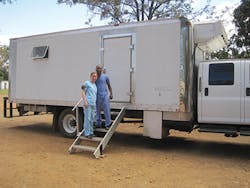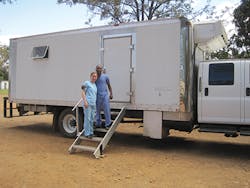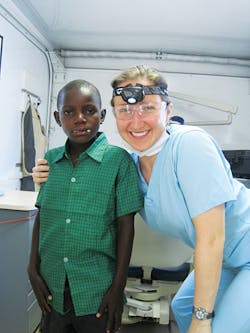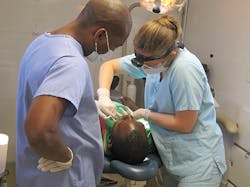Dental mission in Zambia
By Rachel Hymes, DMD
On June 7, 2014, our long-awaited trip to Africa began. Planning for this trip started eight months prior in October through my emailing every volunteer organization on the ADA's volunteer webpage. Due to time restraints and not owning any of my own equipment, I was unsure if I would be able to find an organization that would provide all of the necessary materials and equipment. I was pleasantly surprised to find the International Caring Hands organization offered all of this in a mobile dental unit located in Zambia. International Caring Hands made it so easy for us. We were responsible for purchasing our tickets for the flight to and from Zambia, and they took care of our transportation, food, and lodging while we were serving the community. International Caring Hands is a Christian-based organization that has fully stocked mobile clinics throughout the world.
My interest in dental missions was my drive to go to dental school. I was given the opportunity as a student to go on a mission trip with Dental Community Fellowship. Dr. Bill Sasser invited students to get involved in dental missions all over the world. He is an amazing mentor who loves to teach and engage others in service.
Two important things to consider before traveling to practice dentistry in a foreign country are licensure and vaccinations. Randy Meyer of International Caring Hands helped set everything up in Zambia. He took care of making sure my license was valid in order to practice in Zambia. He also was always available to answer any questions I had. We were able to purchase our visas once we arrived at the airport in Lusaka, making that part of the planning process much easier. Several months before we left, we had to see an infectious disease doctor in order to get the vaccinations we needed to travel to Zambia.
One thing I requested for my work in Zambia was to have a local assistant. International Caring Hands set me up with Lucas, who lives and works as a dental assistant in Lusaka. Lucas was a great benefit in helping with translations and helping us understand the culture and the local people better. He was instrumental in helping the people gain trust in what we were doing. Lucas is a wonderful friend, an amazing assistant, and a strong man of God. He was the most invaluable part of our trip. I also have to thank my husband for leading the sterilization process and keeping the truck up and running as we worked. He even assisted in suctioning from afar. I didn't know it was possible to assist while looking the other way so as not to see any blood. I couldn't have done it without either of these wonderful men.
After several long flights, we arrived in Lusaka and were picked up by our driver to begin our two-hour journey on the rough road to Riverside Farm Institute where we would be working. On Monday morning, we were taken down to where "the truck" was, and I didn't know what to expect. This mobile clinic on the back of a truck was much nicer than I had expected. It was equipped with two fully functional dental chairs with lights and attachments for handpieces, just like in our office. It had cabinets with all materials needed, as well as an autoclave and an ultrasonic. Everything was provided in this clinic. Anything that I could think to use was there. I was very thankful to have the handpieces, because I needed to use them several times while doing extractions. We did not take any radiographs, but were given the option to have a laptop provided if we wanted to bring it from the United States. All personal protective equipment (PPE) was provided, as well as cleaning supplies and materials for all restorations. The truck had a generator, suction, and an air compressor, as well as an air conditioner, which we did not need since it was winter in Africa with temperatures between a high of 85 and a low of 50.
Riverside Farm Institute had begun advertising in the nearby villages prior to our arrival, resulting in no shortage of patients. The patients were already lined up Monday morning before we got the clinic up and running. People came from villages far and wide. The main mode of transportation for those coming was to walk to the clinic, but a few of the lucky ones were able to get rides from the very limited cars or trucks. One staff member on site gave out numbers to patients on a first-come, first-serve basis, and most numbers were given out before we even started our day. We started seeing patients around 8:30 a.m. every morning and worked until about 5:30 p.m. We would work to see as many patients as we could each day and usually averaged between 30 to 50 patients per day. We did take at least a 30-minute lunch break every day, very similar to the way most people practice at home. We saw all kinds of patients, ranging from 4 years old to 84 years old with a variety of concerns. Originally our plan was to do extractions as well as fillings, but because of the demand for extractions, we were never able to place any restorations or do any cleanings. Our final day was definitely the most difficult. When it came time to close the clinic, a number of the people who had been waiting all day in hopes of receiving a number and being seen continued to stay. We worked well into the night, but no matter how hard we tried, we were not able to see all those who stayed. It was heartbreaking to hear them ask, "When will you be back?" Lucas said this might be the only opportunity for them to ever get any dental work done.
My husband and I stayed in our own little guesthouse with running water and a bathroom attached. We were staying in a very nice place. We were even able to drink water from the tap, although we did buy a lot of bottled water when we arrived. It is so important to stay hydrated. We stayed at Riverside Farm Institute, which is a Seventh Day Adventist outreach education community and farm. Riverside Farm Institute has several hundred acres of farmland and education centers along the river in Kafue. It was wonderful to be a part of the community while we were staying there. We felt very safe at all times, and even took walks around the beautiful grounds in the evening after dark. The community is very interested in health and nutrition and fed us delicious homemade vegan food while we were there.
While in Zambia, we were able to borrow a car from the site where we worked to travel to the southern part of the country to see Victoria Falls, the largest waterfall in the world. It was so nice to be able to combine mission work with a vacation. On our drive to Livingstone, we saw many villages along the road, as well as some monkeys. The majority of the people lived in mud huts with thatched roofs. We were able to tour one of the local villages and even experienced a herd of elephants coming through on their way to the river. It was quite an experience!
This trip was rewarding in so many ways. The people were so grateful and willing to do whatever was needed so that they could get this service. Mission trips really put our life in America into perspective. We have so much more than we need, and we were reminded of that every day while we were in Africa. It was wonderful to know that we were able to get many people out of pain, but there are still so many more people who need access to care. I am looking forward to going back in the future to serve this wonderful community again and am so very thankful for this opportunity.
Rachel Hymes, DMD, practices at an FQHC in Mountain City, Tennessee, and enjoys serving communities in need in other countries. She is also active in the ADA New Dentist Committee. Dr. Hymes can be contacted at [email protected].



